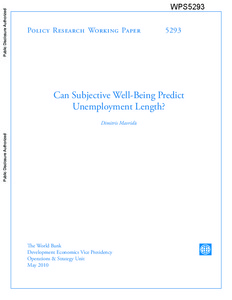Can subjective well-being predict unemployment length?

World Bank - Washington, DC
2010
50 p.
job searching ; social norm ; statistics ; unemployment ; well being
Policy Research Working Paper
5293
Social protection
English
Bibliogr.
"This paper uses 16 waves of panel data from the British Household Panel Survey to evaluate the role of subjective well-being in determining labor market transitions. It confirms a previous finding in the literature: individuals report a fall in their happiness when they lose a job, but they report a smaller fall when they are surrounded by unemployed peers, an effect called the "social norm". The main results of interest are that job search effort and unemployment duration are affected by the utility differential between having a job and being unemployed. Since this differential is also affected by the social norm, it implies that when unemployment increases, the unemployed are happier and they reduce their search effort. These results indicate that unemployment hysteresis has labor supply causes."
Digital
The ETUI is co-funded by the European Union. Views and opinions expressed are however those of the author(s) only and do not necessarily reflect those of the European Union or the ETUI.